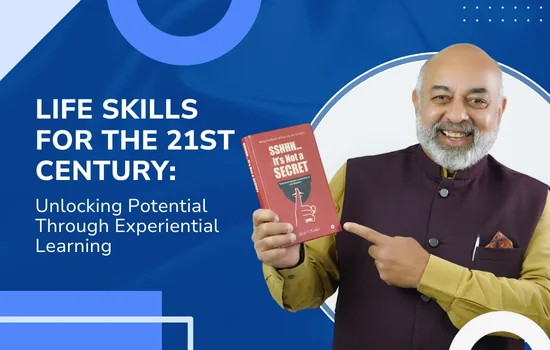
In today’s rapidly evolving world, knowledge and technical skills alone are no longer enough. Many young professionals, despite their degrees and qualifications, struggle to apply what they’ve learned in real-world scenarios. The traditional education system, with its emphasis on rote learning, often produces individuals who are academically competent but lack critical life skills—communication, decision-making, teamwork, and adaptability—that drive long-term success.
The key to bridging this gap lies in experiential learning, an approach that goes beyond textbooks and theories. By immersing individuals in real-life challenges, experiential learning cultivates leadership, resilience, and a growth-oriented mindset—qualities essential for thriving in the modern workforce.
This blog explores why experiential learning is the ultimate game-changer for developing attitude-driven leadership and preparing individuals for the demands of the 21st century.
Leadership vs. Management
Leadership is the art of inspiring individuals to take action in a way that feels natural and self-driven. It is more about inspiring them rather than merely motivating them. Inspiration is an internal force, whereas motivation is externally driven.
Leaders possess qualities such as commitment, integrity, risk-taking ability, decision-making skills, passion, honesty, trustworthiness, communication, coordination, vision, foresight, perseverance, and humility. When we truly study these traits, we find that only a small percentage fall under knowledge and skills, while a vast majority, nearly 90%, stem from attitude.
Management is based on knowledge and skills, but leadership is mainly about attitude. Even communication, often categorized as a skill, is first a function of attitude before it becomes a skill.
Understanding Attitude: The Core of Leadership
Attitude can be defined as an instant reaction to an external influence or stimulus. The subconscious mind controls attitude, dictating about 95% of our routine actions, while the conscious mind governs only the remaining 5%. This is why emotions like anger occur automatically rather than through deliberate thought.
With knowledge readily accessible through technology, just a Google or ChatGPT search away, and skills honed through repeated practice, the real challenge lies in cultivating the right attitude. But who teaches attitude? Life itself serves as a teacher, but its lessons are often time-consuming, emotionally taxing, and financially costly. The real question is: how can one develop the right attitude in a shorter time span?
Experiential Learning: The Game-Changer
Conventional education remains focused on rote learning and passive instruction. However, to develop attitude effectively, a more impactful methodology is required—Experiential Learning. This method helps individuals immerse themselves in real-life situations where they learn by doing, making mistakes, and receiving immediate feedback.
For example, consider learning to ride a bicycle or swim. No one masters these skills by reading books or taking notes. Instead, they learn from an experienced individual, practice repeatedly, and often fail before they succeed. The beauty of experiential learning is that once a skill is acquired, it remains ingrained for life, whether it’s swimming, cycling, or leadership.
Experiential learning works mainly because failure, when experienced in a controlled environment, teaches individuals to accept setbacks as part of the learning process. It fosters resilience, adaptability, and effective decision-making—qualities essential for entrepreneurs and corporate leaders. Risk-taking, a crucial trait of any leader, cannot be learned by memorizing theoretical concepts; it must be lived and experienced firsthand.
The Role of Sports and Outdoor Activities
One of the best ways to cultivate leadership and teamwork is through sports. Team games such as football, hockey, basketball, and volleyball (as opposed to cricket, which involves too much idle time) compel individuals to compete, collaborate, and make real-time decisions under pressure. These experiences simulate real-world challenges where quick thinking, teamwork, and perseverance are essential.
Outbound camps further enhance leadership development by placing individuals in unfamiliar, high-pressure environments where they must strategize, communicate, and problem-solve effectively. Such experiences are invaluable in shaping well-rounded professionals sought after by the corporate world.
Transforming Education for the Future
To prepare students for the 21st-century workforce, educational institutions must integrate experiential learning into their curriculum. ‘Learning by doing’ should replace passive memorization, ensuring students develop the attitudes and skills necessary to thrive in dynamic, high-stakes environments. The armed forces have long employed experiential learning in institutions such as the National Defence Academy (NDA), Naval Academy, and Indian Military Academy (IMA), proving its effectiveness in leadership development.
In conclusion I would like to quote :
“Knowledge and skill will get you the interview… It’s the attitude that will get you the job and take you higher”
About Cdr. Girish Konkar (Retd.)
Cdr. Girish Konkar (Retd.) is a seasoned leadership coach, keynote speaker, and corporate mentor with over two decades of experience in leadership development. A former officer in the Indian Navy, he brings a unique blend of military precision, strategic thinking, and real-world leadership insights to his coaching. Through his expertise, he helps individuals and organizations cultivate resilience, adaptability, and high-performance mindsets. Cdr. Konkar is passionate about transforming leaders by integrating discipline, emotional intelligence, and values-driven leadership into modern business environments.





